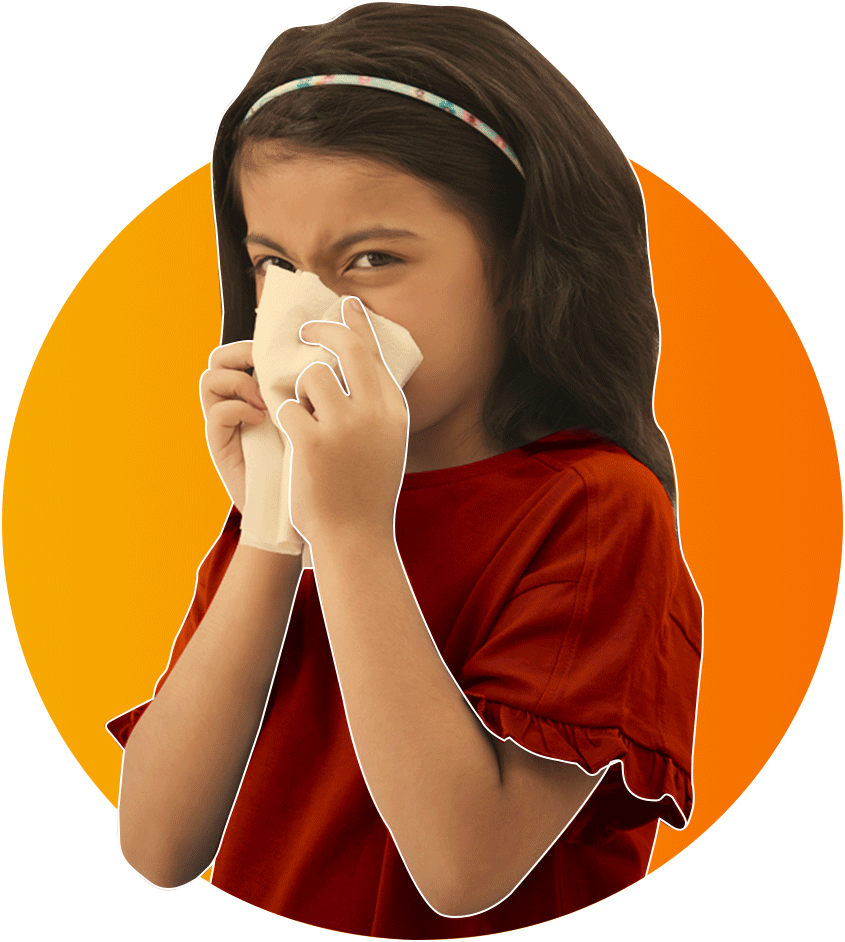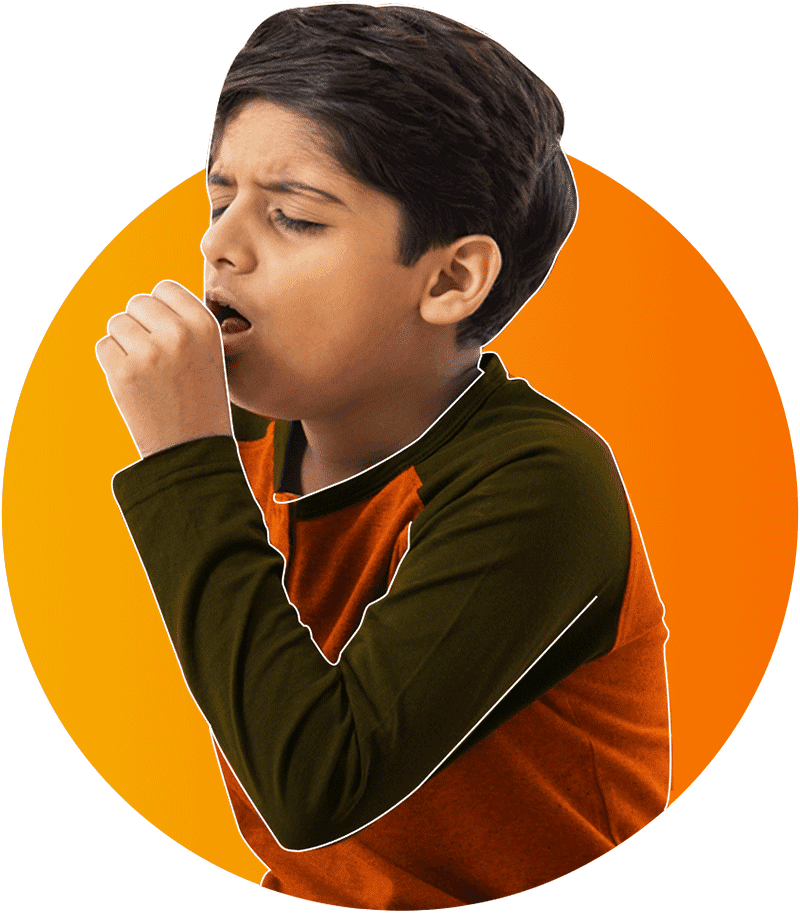• DID YOU KNOW?
Cough is a protective reflex and children with no evidence of illness may also cough an average frequency of 11 times over a day.
Determining what is a normal cough from that which is serious can be challenging for both parents and your doctor. However you can guide the doctor by making some key observations about your child’s cough.
WHAT ARE THE COMMONLY DESCRIBED COUGH TYPES?
Coughs are often described as ‘wet’/ ‘moist’ or ‘dry’. Dry coughs are often due to irritation in the upper airways — the sinuses, throat, and vocal cords. Irritation in the airways below the windpipe can also produce a dry cough. Generally, when the lower airways produce mucus in response to the irritation it is described as wet cough. Determining whether the cough is dry and irritating or wet and “rattly” may help to diagnose the cause, particularly if the cough is chronic.
HOW LONG HAS THE COUGH LASTED?
Cough in children can be categorised based on duration of cough, such as:
1.Acute cough:
cough lasting for less than two weeks
2.Sub-acute or persistent cough:
lasting two to four weeks
3.Chronic cough:
lasting for more than four weeks
WHAT ARE THE CAUSES FOR DIFFERENT
TYPES OF COUGHS?
Acute and sub-acute cough in children is usually caused due to a viral respiratory tract infection that generally resolves within one to three weeks in about 90% of children. Among Indian patients visiting different health-care facilities, upper followed by lower respiratory tract infections are the main causes of acute cough. Other causes of acute cough may include asthma, pneumonia, or pertussis (also known as whooping cough). Inhalation of foreign body or substance should also be suspected in case of acute cough in children.
Acute cough may also indicate the start of a chronic cough condition, that may be caused by recurrent viral infections. Causes of chronic cough in children are:
Persistent respiratory infection—post-viral cough, chronic bronchitis, bronchiectasis, cystic fibrosis, pertussis, and tuberculosis
Passive exposure to cigarette smoke
Asthma
Habit cough
Upper airway cough syndrome
Gastro-oesophageal reflux
Postnasal drip
In chronic cough, recurrent viral bronchitis is very common where bouts of coughing associated with bronchitis occur due to viral upper respiratory tract infections.
WHAT ARE THE TYPES OF COUGHS ASSOCIATED WITH
VIRAL INFECTIONS?
POST-INFECTIOUS COUGH
Viral infections may cause prolonged periods of continuous cough termed post-infectious or post-viral cough. It is a self-limiting cough not lasting more than 8 weeks, that persists after viral or virus-like infections. You will be surprised to know that a healthy preschool child visiting can have up to 8 episodes of viral respiratory infections with a cough every year, each lasting about 10 days.
HABIT COUGH
This type of cough can occasionally persist after a simple viral respiratory infection, and without any clear physical cause. Habit coughs are dry and repetitive coughs also called “honking” coughs. Coughing is usually noticed when a child is awake and not asleep.
WHAT ARE THE TYPES OF COUGHS BASED ON SOUND?
BRAKING OR CROUPY COUGH:
The sound of croupy cough is a distinct dry or brassy cough which is accompanied by a high-pitched whistling on breathing; it is also referred to as stridor. Croup is an upper airway infection which causes swelling in the area just below the vocal cords, which makes the movement of air difficult, and hence a whistling sound.
WHEEZING COUGH:
A cough that is coupled with wheezing when breathing out may suggest asthma. In asthma, the lungs and airways are easily inflamed when your child is exposed to certain allergens such as inhaling pollen or catching a cold or other respiratory infection; it also, causes breathlessness in children.
WHOOPING COUGH
A high-pitched or whoop sounding cough is usually associated with a bacterial infection (pertussis). For the first week of cough, children may have a runny nose and flu-like symptoms and the whooping cough episode can last up to 6 weeks. Some children may also appear to have a choking or gagging or inability to breathe while coughing.
CHOKING COUGH:
If your child has a very sudden choking episode; or has an episode of choking followed by dry cough later, it may be related to inhalation of a foreign body such as a toy or a morsel of food. These episodes may be subtle and commonly occurs in younger children about two to four years of age. It is good to be informed that in case your child is conscious but can’t breathe,talk, or make noise, or is turning blue immediate medical attention is required.

WHAT ARE THE OTHER COUGH TYPES?
IRRITANT COUGH: Cough: Children who are exposed to environmental pollutants such exhaust from wood burning, air pollution and exhaust from vehicles or tobacco smoke are at risk of developing an irritant cough. This cough type may worsen later and be associated with asthma or rhinitis.
Although cough protects your child’s body by removing mucus, irritating substances, and infections from his or her respiratory tract there are certain red flags that you should be aware of to manage cough in children.
WHAT ARE THE COUGH SIGNS THAT ARE ALARMING IN CHILDREN?
The onset of cough in a newborn
Cough during feeding
Sudden onset of cough or a history of choking that may suggest foreign body inhalation
Chronic, wet cough with sputum production
Continuous, unremitting, or worsening cough
Cough is associated with other features such as shortness of breath, rapid breathing, night sweats, weight loss or haemoptysis (or coughing up blood)
If your child has a cough that lasts more than two to three weeks, which may be due to asthma, allergies, reflux, or other causes schedule a visit with your physician. As a parent, if you are still concerned about your child’s cough despite reassurance from your doctor, you can consider another visit.
